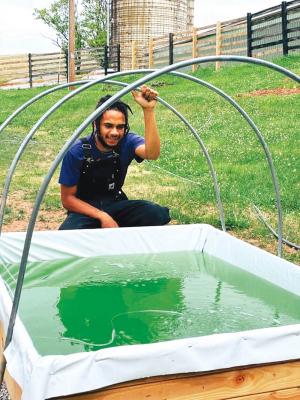2023 - Volume #47, Issue #5, Page #23
[ Sample Stories From This Issue | List of All Stories In This Issue | Print this story
| Read this issue]
Microalgae A New High-Value “Crop”
 |
Taking it a step further, he founded MycoSymbiotics, a permaculture research and production business that grows and markets microalgae for human consumption as a health supplement or whole food additive.
For his own production unit of microalgae, he starts by acquiring a small vial or bottle containing living cells found in nature, or online from a culture bank. He recommends new growers start with spirulina algae, keeping some of the culture separate indoors in case of issues and a need to start over with outdoor growth.
Producers can begin growing microalgae in glass bottles, eventually expanding to small backyard pools. The water needs to be agitated, and nitrogen and phosphorus salts added.
“Normally, I do small scale, a couple of pounds of fresh, dry material a week,” Padilla-Brown says. “Microalgae is nutrient-dense, so you don’t need a lot. The World Health Organization shows that 1 to 3 grams of dried spirulina helps maintain nutritional fitness and helps reverse malnutrition. Many algae also contain central fatty acids and amino acids.”
Padilla-Brown has an online e-book and YouTube videos showing how to set up a small-scale microalgae system using food-grade plastic liners, sunlight, and nutrient-rich water.
“Large amounts of algae can be grown in outdoor spaces like rooftops, driveways, or sidewalks,” he says. “It doesn’t require fertile land, and once people get a feel for growing it around the house or in small pools, the yields at greenhouse scale become large enough to support livelihoods.”
Fresh spirulina algae have about a 5-day shelf life and are excellent for use in restaurant meals. Dehydrated powders, capsules, and freeze-dried portions last for years.
Padilla-Brown says fresh algae sells for about $100 a pound or $25 for 4 oz. at markets. He estimates the cost of a small-scale farm start-up at around $2,500.
Contact: FARM SHOW Followup (priyanka@mycosymbiotics.com; www.mycosymbiotics.com).

Click here to download page story appeared in.

Click here to read entire issue
To read the rest of this story, download this issue below or click here to register with your account number.




